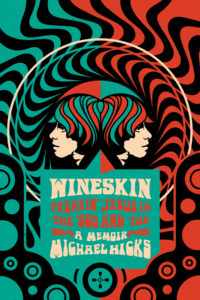 Title: Wineskin: Freakin’ Jesus in the ‘60s and ‘70s
Title: Wineskin: Freakin’ Jesus in the ‘60s and ‘70s
Author: Michael Hicks
Publisher: Signature Books
Genre: Memoir
Year Published: 2022
Number of Pages: 260
Binding: Paperback
ISBN: 9781560854531
Price: $18.55
Reviewed by David Cook
This is the fourth book I have read by Michel Hicks, retired BYU music professor. He is an outstanding writer! The title of this book might be off-putting to some. But there is nothing remotely offensive to the most pious of pious. It is a wonderful autobiography of Dr. Hicks, early life through college and grad school.
The title comes from the name of coffee shop he frequented as an adolescent involved with the “Jesus Freak” movement. Hicks grew up in the Bay Area in the time of seismic change in American society. He describes his involvement in these changes that were on full display in the area. Being a bit younger than Hicks it was a fun read about the early days of the boomer generation and especially the music. Dr. Hicks is about the same age my brother. I remember when he brought home Santana’s first album, released in 1969. I became fixated on it. I’d come home from school and listen to the entire thing for months. When Hicks described attending an early Santana concert it transformed me back to my parents living room listening to those same tunes and singing along to “Evil Ways”.
The book is a thought-provoking and engaging read that challenges readers to reconsider their preconceptions about faith, spirituality, and the role of religion in modern society. Hicks uses his own personal journey from a traditional, conservative Christian upbringing, to being apart of the Jesus Freak movement of the 70’s, to his conversion to the LDS faith, his missionary experience, excommunication, and return. I’ll bet in the history of BYU there has never been a faculty member like Dr. Hicks.
Hicks is honest and vulnerable in sharing his own struggles with doubt, questioning, and ultimately, transformation. He offers a nuanced and empathetic perspective on the challenges of reconciling traditional religious teachings with modern values of equality, social justice, and personal freedom. Throughout the book, Hicks emphasizes the importance of empathy, humility, and openness to learning from diverse perspectives in the pursuit of spiritual growth and understanding.
Another key theme of the book is the concept of Jesus as a radical, nonconformist figure who challenges the status quo and inspires transformational change. Hicks argues that this vision of Jesus is often overlooked or suppressed in mainstream Christian teachings, which prioritize conformity and tradition over innovation and creativity. He encourages readers to embrace a more dynamic and transformative understanding of Jesus and his message, one that emphasizes the importance of empathy, compassion, and radical love.
Wineskin is a compelling and inspiring book that challenges readers to rethink their assumptions about faith, spirituality, and the role of religion in contemporary society. Hicks’ personal journey, combined with his insightful and thought-provoking reflections on faith, make this a must-read for anyone interested in exploring the intersection of religion and social justice.
